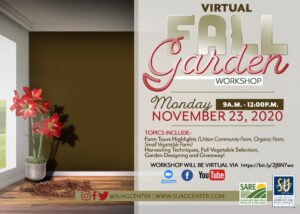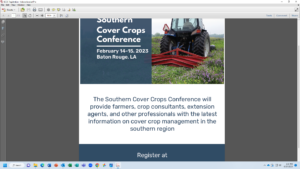Final report for SLA20-002
Project Information
The Louisiana State University AgCenter (LSUAC) in collaboration with the Southern University Research and Extension Center (SUAREC) will implement programs that enhance the capabilities of Louisiana’s agricultural professionals in the area of sustainable agriculture. Themes for 2020 – 2021 include: pastured poultry, fall garden and the Louisiana Sustainable Agriculture Working Group (LA SAWG) annual meeting as well as regional sustainable agriculture related conferences and workshops. Louisiana State University AgCenter and Southern University Agricultural Center extension personnel will be strongly encouraged to attend the training sessions. Information delivery systems to be utilized include workshops and long-distance education training sessions, field trips, resource manuals and informational bulletins. The Louisiana Sustainable Agriculture Advisory Board will meet twice annually for programmatic planning and evaluation. The Program Assistant (half-time), funded by this project, will be responsible for maintaining the state SARE website (http://www.southernsare.org/SARE- in-Your-State/Louisiana) and Facebook page. The other duties for this position include assisting in coordination of the state workshops and field days, the SSAWG scholarships and arrangements, the sustainable agriculture materials generated by the project, promotion of SARE resources and grant opportunities, and development of on-line and hard copy sustainable agriculture resources.
The overall objectives of the Louisiana Model State Plan (MSP) are:
• Conduct workshops on sustainable agriculture for extension and agriculture professionals.
• Maintain the state SARE website with sustainable agriculture materials and resources, and links to related state organizations.
• Conduct bi-annual state advisory board meetings with the purpose of revising and modifying the strategic plan.
• Identify annual training objectives with the input from the Louisiana Sustainable Agriculture Advisory Board.
• Encourage extension and agricultural professionals to continue to attend sustainable agriculture meetings such as the Southern Sustainable Agriculture Working Group annual meeting.
• Continue participation in workshops, meetings, and field days that highlight sustainable agriculture practices.
• Promote the SARE program results, resources, and grant opportunities in Louisiana.
The MSP for Louisiana will allow for enhanced programming effort beyond the state plans of work for the separate institutions (SUAREC, LSUAC). The MSP has allowed for the increased number of training sessions per year. The MSP has allowed the Louisiana SARE PDP to have greater resources available for training activities, using the Southern SARE Louisiana webpage for sustainable agriculture resources, as well as increased coordination and networking. The hiring of a program assistant through the SARE PDP allowed for a unified sustainable agriculture programming effort for the state.
The Louisiana Sustainable Agriculture Advisory Board meets biannually and reviews the past year’s activities and strategic plan as well as the next year’s activities and plan. The 2020-2021 strategic plan and cycle is proposed to focus on themes different than the previous year. The successive years build upon the past workshops and trainings and the needs of the Louisiana SARE PDP stakeholders and feedback from the participants.
Advisors
Education
Education & Outreach Initiatives
To learn about Urban Farming from 3 urban Farms with different missions
Fullness Farm: a for profit Family farm sells at the Baton Rouge Farmers Market and also they have a CSA. They have college student interns.
Baton Roots Urban Farm is a Non profit and their main objective is training of youth and residents of a food dessert, and also get the volunteers to learn and help to maintain the farm.
Two of the previous farms are located in the Baton Rouge area.
Halls Family Farm, a small urban farm located in a small town, Northeast Louisiana. I for profit Farm and working with youth programs, 4H and local Schools.
All the speakers shared information on planting, harvesting and marketing. Because of Covid 19, the interest in growing food as increased exponentially, the online response we had is very positive
Objective:
A wide range of topics was included such as: Cover Crop Use in Organic and Vegetable Systems; Utilizing Cover Crop Biomass for Forage; Cover Crop Impacts on Pest and Weed Management; Unintended Consequences of Cover Crops; Choosing Cover Crop Varieties
SARE Travel funds were utilized to pay for 14 Extension Agents and Ag. Professionals to attend the event.
Southern University Extension agents, Ag Professionals, Faculty member were able to attend the Conference.
SARE Travel funds were utilized to pay for 14 Extension Agents and Ag. Professionals to attend the event.
Topics covered: USDA/NRCS Resources, Farm Business and /taxes, Regenerative Agriculture.
https://www.eventbrite.com/e/louisiana-women-in-agriculture-conference-expo-2023-tickets-537988808007
Attendees were able to network and learn about topics related to Women and Agriculture.
Topics
It is our goal to provide SUPPORT, EMPOWERMENT and EDUCATION to our amazing Women in Agriculture who are Growing Louisiana’s Future!
Seven female Extension agents, Faculty members and ag professionals attended this event. Registrations were covered by SARE travel funds.
Educational & Outreach Activities
Learning Outcomes
Project Outcomes

